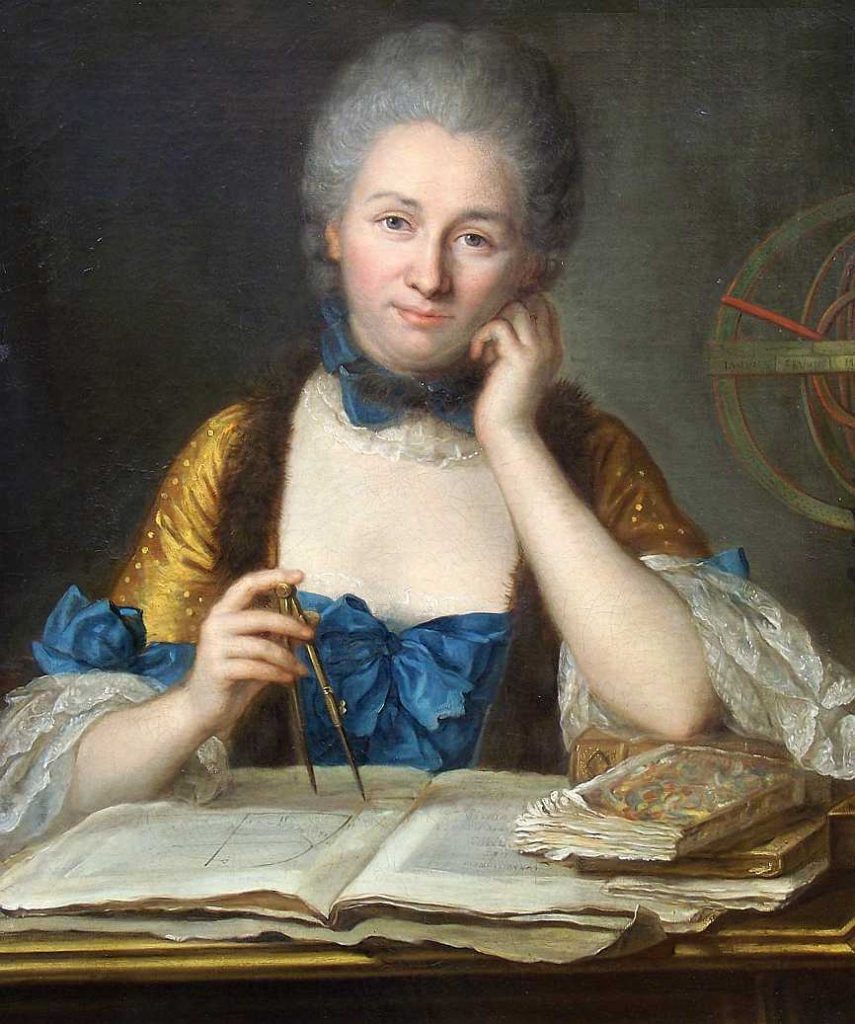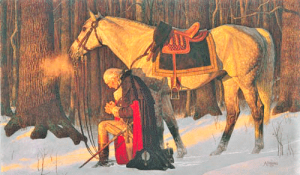In the early Eighteenth Century, intellectual themes were not part of women’s duties, and it was frowned upon for women to research and question. That is why it is so extraordinary that Émilie du Châtelet, a French woman, became a mathematician and scientist. Voltaire told the king of Prussia, Frederick the Great, in a letter that Châtelet was “a great man whose only fault was being a woman.”1
In 1706, when Émilie du Châtelet was born, French society had restraints on women that men did not face, such as not having real access to education. In Early Modern France, “the state would control the fathers, the fathers would control the families.”2 However, the Enlightenment Era did bring about enough change in France so that it was possible for Châtelet to become educated and advance in her career.3 She was lucky in the fact that she had an “unusually enlightened” father who gave Châtelet such a good education. She was educated in Latin, Italian, English, Spanish, Greek, Mathematics, Astronomy, Geography, and Poetry. Her mother also encouraged her and reflected a “cultivated background.”4
Châtelet changed and influenced society through her work on mathematics and scientific works. She published an introduction to Newtonian mechanics in 1740, and she even translated Newton’s Principia into French, with comments explaining the difficult mathematics to a popular audience.5 This was significant because not only could more of the population now read the works of Newton, but because of her commentary, more of the population could now understand it. It also introduced Newton into mainstream French scientific life. She went into detail on Newton’s theory of Gravity and she recast many of Newton’s theories and results in the “more powerful and suggestive notation of…. Calculus.”6 This had a great effect on the other scientists and mathematicians of the time. Châtelet’s work helped others to understand the complicated Newtonian system. By exploring Newton’s theses, and writing them for the educated public to read, Châtelet changed France.

Châtelet was married in June 1725 to Florent-Claude, marquis du Châtelet and count of Lomont. However, after only three years with her, he left to pursue a military career and rarely visited her. This is when Châtelet began an affair with Voltaire, another lover of Math and Science.7 In order to get her works published, Châtelet had to have Voltaire co-author them with her, but only his name appeared on the front cover. Emily Grosholz writes that Voltaire had not mastered the mathematics from the Principia, but instead relied on Châtelet to “write the technical sections of the book” he was writing called Elements of Newton’s Philosophy.8 Châtelet also discussed research on the solar system, electricity, and magnetism. She had just finished her translation of the Principia, when she died of “childbirth fever,” from a scandalous pregnancy with Voltaire.9
In her unusual career, Émilie du Châtelet worked with other famed scholars and succeeded in making mathematics a language that many more people could understand. As a woman, she opened the doors for other women to follow in her footsteps and she changed the world with her concepts and understandings of these men’s topics.
- Jerry Bentley, Herbert Ziegler, and Heather Streets-Salter, Traditions and Encounters: A Brief Global History, 4th ed., vol. 2 (McGraw Hill Education, 2016), 390. ↵
- James B. Collins, “The Economic Role of Women in Seventeenth-Century France,” French Historical Studies 16, no. 2 (Fall 1989): 436. ↵
- Ruth Hagengruber, “Emilie Du Châtelet, 1706–1749: Transformer of Metaphysics and Scientist,” The Mathematical Intelligencer 38, no. 4 (December 1, 2016): 1. ↵
- Ruth Hagengruber, “Emilie Du Châtelet, 1706–1749: Transformer of Metaphysics and Scientist,” The Mathematical Intelligencer 38, no. 4 (December 1, 2016): 2. ↵
- Emily Grosholz, “Candles in the Dark: Emilie Du Chatelet and Mary Somerville,” The Hudson Review, no. 4 (2013): 669. ↵
- Emily Grosholz, “Candles in the Dark: Emilie Du Chatelet and Mary Somerville,” The Hudson Review, no. 4 (2013): 669. ↵
- Complete Dictionary of Scientific Biography, 2008, s.v. “Châtelet, Gabrielle-Émilie Le Tonnelier De Breteuil, Marquise Du.” ↵
- Ruth Hagengruber, “Emilie Du Châtelet, 1706–1749: Transformer of Metaphysics and Scientist,” The Mathematical Intelligencer 38, no. 4 (December 1, 2016): 2-3. ↵
- Emily Grosholz, “Candles in the Dark: Emilie Du Chatelet and Mary Somerville,” The Hudson Review, no. 4 (2013): 669. ↵



81 comments
Samman Tyata
Great article, I really liked the way how you shaped your article. Furthermore, the article successfully provides a brief description of the life of Émilie du Châtelet. It is really amazing that she coped will all the problems to be successful. It’s awesome how she translated Newton’s laws so others could understand it effectively. Additionally, it’s interesting that her work had a great effect on the other scientists and mathematicians of the time. I really got inspired by her story. Great job!
Brianda Gomez
I really enjoy reading articles like this one because Châtelet broke all rules and succeeded. She went against what other people said or thought about her. She knew she wanted a very good education. Some languages she knew were, Latin, Italian, English, Greek and Spanish. She also studied mathematics, astronomy, geography, and poetry. Women like her inspire me to do better in this world. It is amazing how some women can be strong and independent and do all that is possible to accomplish their dreams.
Rafael Azuaje
I have two sisters both of them college educated. My older sister majored in computer science, and my younger sister majored in evolutionary biology. My wife is college educated as well. I wonder how their lives would be without the opportunities they have had so far. I wonder why I had not heard of Émilie Du Châtelet before. Things sure have changed since the 18th century.
Matthew Rios
It’s truly unfortunate that a brilliant mind of the past was held back because she was a woman. Most people today don’t even have a full mathematical grasp of Newtonian Physics the way Émilie probably did. The fact she had to use Voltaire as a means to get her work out also was indicative of the unfortunate status of women in the past.
Alexis Renteria
Its great to hear what Émilie du Châtelet accomplished during her time. And its more of an accomplishment when women were frowned upon for learning. I am also glad that she had such a supportive father that taught her well. However, its a shame that when she tried to get her work published with the help of Voltaire, only Voltaires name was on the front cover. And although she did not get the recognition she deserved during her time, her accomplishments are very well valued today by everyone.
Richard Navarro
Such an interesting article. It makes me wonder how many women at that time had such knowledge yet were afraid to speak up. I wonder how life would have been if women would have never been under men. If they had access to education at an early age, or even had access to work at an earlier time in life. How would our nation be? If women had a say when the colonies first settled, if they had a say in our government system early on. How would life be now.
Erin Vento
It’s disappointing that we never hear about bright, trailblazing women like Châtelet in school, but I really enjoyed briefly reading about her life and accomplishments. It was great to learn about a woman who almost singlehandedly brought France a greater understanding of science and mathematics. If it hadn’t been for the ways of society back then, she would have gotten revered more as the leader and intelligent woman she was.
Sebastian Castro Ramos
I like to know more about scientists who broadened the knowledge of a population, as Châtelet did when she not only translated Newton’s Principia, but also made comments that explained on everyday language mathematical concepts and ideas conceived by Newton. It is interesting how she managed to use Calculus to further explain Newton’s ideas. Excellent article, very descriptive and the topic is very interesting.
Oceane Roux
Great article! I really appreciate reading articles about such incredible women. Emilie du Châtelet was a good example of the way women were perceived during the Enlightenment period. The fact that as a woman she couldn’t be fully seen as a scientist despite the changing mentalities shows that even if they were making progress in the women’s rights, they still had a lot to accomplish.
Evelin Joseph
Even in our modern day world, people sometimes look down on women in high power with great intellect, so it is astounding to me that Émilie du Châtele had such great achievements in the Eighteenth century, when it simply was not right for a woman to be educated as she was. It is inspiring to read about her questioning her society and its standards. I am glad that such a woman was out there bringing opportunities to girls like me. It is depressing that she didn’t get the recognition that she deserved in her time, but I hope she will be well known through at least our generation.